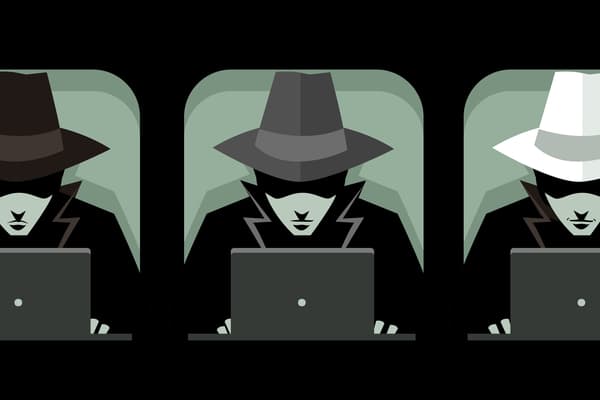What comes to your mind when you think of a hacker? Perhaps a technology geek who overrides every security system to access secure information. However, did you know that there are different types of hackers depending on their intention?
The industry terminology defines hackers based on color, from black hat to white hat and a couple in between. But how does all of it impact business globally?
Data shows that mid-size organizations with 500-999 employees face increasing security threats. But they don’t have enough human or financial resources to deal with the problem. Numbers suggest there is a new cyber attack on the internet every 39 seconds, which makes about 2,244 breaches every day.
On the other side of the table, 36% of hackers believe there is more income in defending against cyber criminals than in becoming one.
In this article, we will understand who black hat hackers are, the other types of hackers, the laws that apply to black hat hackers, and some famous black hat hackers.
What Is A Black Hat Hacker?

Black hat hackers, also known as crackers, break into computer systems with malicious intent to violate laws and the integrity, availability, and confidentiality of data.
To put things in perspective, the WannaCry ransomware infected over 400,000 systems in two weeks in 150 countries. The damage was $120,000 worth of extortion payments. Fortunately, the security specialists released a decryption tool that limited the extortion amount to just 1% of the potential haul.
Most black hat hackers start as novice kids who try their hands at hacking tools they buy on the web. They often engage in hacking to earn extra money. Some develop their skills to become seasoned hackers working with sophisticated organizations that offer hacking services to legitimate businesses. Many black hat hackers specialize in specific areas, such as phishing, remote access, and more.
Imagine an internet user who clicks on an email that is a trojan horse and downloads malware which slows the system down. Precisely at this point, the user gets a call from a service center that offers services to fix the computer. This isn’t a coincidence, but a well-coordinated black hat attack. This type of attack doesn’t rip the customer point blank but creates a situation where the customer pays for a service he didn’t need in the first place.
Different methods a black hat hacker use are –
- Keylogging – This is the most common method that uses software to monitor all the keys you press on the keyboard. The program records everything in a log file which hackers can analyze to find personal information such as IDs and passwords.
- Phishing – It is similar to fishing, where you attach a bait to the hook and let the fish fall for it. Phishers create fake websites that look similar to the original ones and send them to you via email. The goal is to make you fill out a form or pay online to reveal your personal information. They may also trick you into downloading malware.
- Brute force – It is a comprehensive search method that uses all combinations of a password using an algorithm.
- Ransomware – As the name suggests, these attacks hold your data hostage and ask for a ransom to let you access it. Hackers trick you into downloading malware that encrypts your data. If you want to unlock it, you need to pay the hacker. The hacker sends you instructions to make the payment and get the decryption key.
- Distributed Denial-of-Service – The DDoS strategy takes down entire websites and prohibits the business from running its service. Coordinated attacks on the websites of large businesses aim to crash all online assets.
- Viruses, worms, and trojans – These are industry terms and standard methods a black hat hacker uses to cause harm. While you can install a virus from an executable file of software, worms look for weaknesses in a system. Trojan horses appear to be legitimate software that is a copy of the original ones.
- Fake W.A.P – A black hat hacker can use software to impersonate a wireless access point (W.A.P). This fake W.A.P. connects to a public access point that you may be using. Once you connect to the fake W.A.P., the hacker steals your data.
- Cookie theft – Using cookie theft, hackers masquerade as legitimate users to whom you have issued the cookie. By doing this, hackers gain access to web services without the challenge of knowing the login credentials.
What Other Types of Hackers Exist?

Black hat hackers are not the only ones out there. Other legitimate ones work for companies on a payroll. Here is the list –
White Hat Hackers
White hat hackers are also called ethical hackers. They are the antidote to malicious hackers. Ethical hackers work as penetration testers who focus on finding vulnerabilities in the system and assessing the risk.
Once they find the potential weak points, they advise the company to fix those. Large organizations that handle sensitive data hire white hat hackers to identify security flaws and enhance their security features.
Other than penetration testing, the ethical hacking skills of a white hat hacker include reconnaissance and research, programming, understanding digital and physical tools, and social engineering.
Gray Hat Hackers
Gray hat hackers operate by violating ethical principles and standards, but not with malicious intent to steal data or for financial gain. They are in the middle ground between white hat hackers and black hat hackers. While a gray hat hacker discovers the system vulnerabilities and makes them public, a white hat hacker would do so in private.
Green Hat Hackers
Green hats are the newbies in the hacking world. They may not be aware of the intricacies and security mechanisms of the web but are keen learners. Green hat hackers look forward to making a mark in the hacking community without the intention of causing harm.
They may be harmful because they often cause harm without intent or knowing the consequences, and do not know how to fix it.
Blue Hat Hackers
Blue hat hackers may be of two types – those who seek personal revenge and those whom companies hire to test new software and products for vulnerabilities.
If they are seeking revenge, they don’t care about money or fame. They hack to seek revenge on an individual, institution, government agency, or employer. Blue hat hackers use malware to deploy cyber-attacks on their enemies.
Large organizations sometimes hire blue hat hackers and have them work outside of their premises. They test new software to find security vulnerabilities before release. Blue hat hackers also participate in conferences where they find vulnerabilities in software through penetration testing.
Red Hat Hackers
Like white hat hackers, red hat hackers also want to save the world. But they adopt extreme and illegal methods to do so. They take the wrong path to achieve the right result. Red hat hackers deploy dangerous cyber-attacks on black hat hackers.
Red hat hackers infect the systems and malware, launch DDoS attacks, and use tools to remotely demolish the computer systems of black hat hackers.
Laws and Penalties Against Black Hat Hacking

The US federal and state authorities punish black hat hackers under various computer crime offenses and other state and federal laws. The conviction depends on different classes of felonies and misdemeanors and could range from jail time to fines or both.
Some notable laws against black hat hacking are –
- Computer Fraud and Abuse Act (CFAA – 1986) – It is a federal crime to access a protected computer without authorization.
- Digital Millennium Copyright Act (DMCA – 1998) – It works against the criminal act of disseminating technology, devices, and services and controlling access to copyright works.
- Electronic Communications Privacy Act (ECPA – 1986) – This act protects all communications over a wire, internet, or oral while in transit.
The laws prohibit a person from conducting any of the following activities –
- Accessing secure computer networks or systems.
- Disclosing, modifying, or compromising the data.
- Transmitting malicious software code to harm computers or data.
- Accessing systems and networks for financial fraud.
- Trafficking system passwords.
The Cybersecurity Enhancement Act and Communications Assistance for Law Enforcement Act allow agencies to access data stored by an ISP. They don’t need a warrant and may use modified telecom devices for surveillance.
Outlook for Black Hat Hacking

With more businesses going online, black hat hacking is becoming a global problem that is growing in significance and frequency each year. Data breaches have nearly doubled in recent years.
Some black hat hackers intend to install malware on your system to extract trade secrets or hold your data for ransom. Others want to sell your information on the dark web or just cause chaos.
Many hacks do not involve human contact. They are automated and swift. In these cases, attack bots search the internet for vulnerable computers they can infiltrate.
This makes it imperative for businesses to be aware of the best practices in computer and information security. Using good antivirus software, virtual private networks (VPNs), and avoiding suspicious emails are good starting points.
Famous Black Hat Hackers
Some of the famous black hat hackers are –
- Kevin Mitnick – Mitnick hacked Digital Equipment Corporation’s computer network to copy the software and served jail time for doing so. He then hacked into Pacific Bell’s voicemail computers, for which he faced a high-profile arrest in 1995.
He faced charges of wire fraud and causing damage to computer security by unauthorized access. Now he runs an information security consulting agency called Mitnick Security and serves as a chief hacking officer at KnowBe4, an anti-phishing vendor.
- Albert Gonzalez – Gonzalez was the leader of a major cybercrime scheme that caused massive data breaches in the US. He and other members of his hacking firm stole and sold payment card information. They stole information from retailers, such as BJ’s Wholesale Club, The TJX Companies, OfficeMax, Sports Authority, and Barnes & Noble.
Gonzales got 20 years in prison for conspiracy, wire fraud, computer system fraud, and identity theft.
- Hector Xavier Monsegur – Monsegur was a well-known member of Anonymous, an online hacktivist community, and LulzSec, a splinter group. He and his affiliate groups carried out online attacks against companies like Mastercard, Visa, and Sony and several government computer systems.
The authorities arrested him in 2011 and charged him for 122 years in prison. He later became an informant for the FBI and assisted in arresting other hackers.
- Karim Baratov and Alexsey Belan – Baratov and Belan were members of the Russian intelligence agency that hacked into Yahoo in 2014 and stole the information of over 500 million users. They intended to gather intelligence for financial gain.
While the authorities arrested Karim Baratov, Alexsey Belan is still at large and is on the FBI’s most wanted list of criminals.
- Gary McKinnon – McKinnon was the mastermind behind the biggest military hack of all time. He hacked over 97 computers that belonged to NASA and the US armed forces. Within a day, he deleted the critical files, including weapons logs, from the systems.
According to estimates, McKinnon caused damages worth $700,000. He still lives in the US, as the country blocked his extradition.
- Jeanson James Ancheta – Ancheta from California used a worm called ‘rxbot’ in 2004 to gain access and control over 500,000 computers, including those of the US military. He had an army of botnets and claimed to take down any website for money.
He sold access to botnets in clusters for money. An FBI agent caught Ancheta and he was sentenced to 5 years in prison.
Conclusion
The black hat hacker menace is global. It is difficult for authorities and cybercrime institutions to catch hold of malicious hackers. They use the computer system of unsuspecting users and may have multiple nodes globally. If the authorities catch hold of a hacker in one country, he/she could have nodes in other criminal organizations across the globe.
Simple tactics to deal with black hat hacking methods are –
- Never download attachments from suspicious emails.
- Always use good quality antivirus software with a firewall and a VPN that protects you over open Wi-Fi networks.
- Always check the email id thoroughly. For example, you could easily overlook the difference between johnsmith@hotmail.com and johnsmiith@hotmail.com.
- Read the full one-time password (OTP) message and ensure it is from a legitimate service before using it online.
- Don’t pay using links sent by email, even if the website looks legitimate.
- Never fill in your details, such as the credit card and CVV number, in a form sent via email.
- Always download mobile applications from legitimate places such as Google Play and the Apple store.
However, these tactics work well if you are an individual. Large businesses such as credit card companies, banks, e-commerce companies, and others that handle sensitive customer data are constantly bombarded with cyber attacks.
They need the right security professionals and technology to not only defend the system owners but also regularly find and plug in the vulnerabilities. That is where the white hat hackers come in to deal with the bad guys.
If you are considering a career in ethical hacking, a certified cyber security specialist course will help build a rewarding career. This will help you enter the ethical hacking industry and make the process legal.
According to the Bureau of Labor Statistics (BLS), cyber security/IT security professionals earned a median wage of $102,600 per year in 2021. The number of jobs currently in the market is 163,000, with a 35% rate of growth which is much faster than the average growth rate of all other professions.ICOHS College offers a 12-month certified cyber security specialist training program. Call us at (858) 581-9460 or fill out the form for more information.
Frequently Asked Questions
What Do Black Hat Hackers Study?
Black hat hackers often start with online hacking tools and self-study for more sophisticated attacks. In some cases, legitimate industry professionals (good guys) become black hats for personal gain. Paid employees sometimes have access to the private data of the system owner and may use it for malicious intentions. Some communities also offer black hat courses over the dark web.
How Do Black Hat Hackers Make Money?
There are several ways for the bad guy to make money, including –
1. Selling private information of millions of customers to a legitimate business for profit.
2. Using private credit card information directly to make profits from online purchases.
3. Acting as an online mercenary and causing damage to a business for a payment from a competitor.
4. Using a victim’s machine for crypto mining.
5. Selling software licenses that are copies of the original but at a low price. Chances are that this malicious software opens a backdoor to your system for the hacker to make further profits.
How Long Does It Take To Become a Black Hat Hacker?
Most black hat hackers start early, especially during college, to earn extra pocket money. If they proceed further, it may take anywhere between 18 months to several years to learn sophisticated hacking skills.









